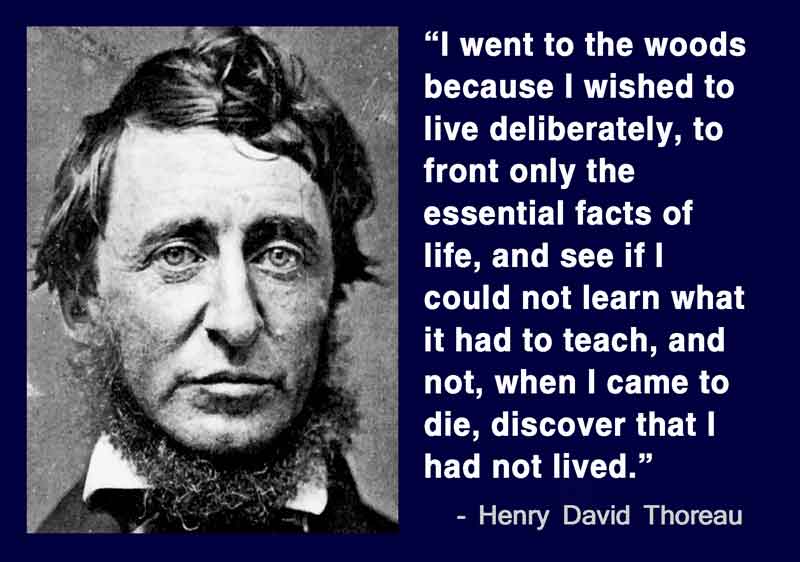I can see it clearly: the American literature textbook from my sophomore year in high school, complete with faded red cover, frayed spine, and a list of students who had rifled through its pages in years past.
In it I discovered a kindred spirit, soul mate and best friend. His name was Henry David Thoreau, and he died 150 years ago today, at the age of 44.
I remember his first words to me:
“I went to the woods because I wished to live deliberately, to front only the essential facts of life, and see if I could not learn what it had to teach, and not, when I came to die, discover that I had not lived.”
They were powerful words to introduce to a teenager, words that spoke to the long-standing vocation of teens everywhere: to question, to challenge, to rebel!
Thoreau went on:
“If a man does not keep pace with his companions, perhaps it is because he hears a different drummer. Let him step to the music which he hears.”
More teenage validation. I was hooked.
To me, Thoreau, who was born in 1817 in Concord, Mass., is one of the most important figures in American history.
Some folks change how people do things. Henry Ford and Steve Jobs come to mind. Others change how people think. Thoreau falls into this latter category, and his influence goes far beyond how quickly we travel (Thoreau was a passionate walker and perfected the “art of sauntering”) or how easily our smartphones can map the route (Thoreau was an accomplished surveyor, too).
Thoreau’s influence can be found in the inspiration his life and his writings provide to the world.
In 1845, at the age of 27, Thoreau set out on one of man’s greatest experiments.
Building a small cabin in the woods by Walden Pond, on property owned by his mentor Ralph Waldo Emerson, Thoreau spent two years and two months living in nature and chronicling his observations. The resulting text, “Walden, or Life in the Woods,” continues to inspire people and is considered by many the bible of the environmental movement.
Likewise, Thoreau’s “Civil Disobedience,” written after he spent a night in jail for refusing to pay taxes to a government that supported slavery, has inspired world-changers such as Leo Tolstoy, Mahatma Gandhi, John F. Kennedy and the Rev. Martin Luther King Jr.
Thoreau was many things to many people, and sometimes he is too easily placed into bumper-sticker purgatory, his evocative and biting one-liners used to advance a particular cause or agenda. Thoreau the Environmentalist. Thoreau the Naturalist. Thoreau the Conscientious Objector. Thoreau the Transcendentalist. Thoreau the Abolitionist.
Thoreau was all these things, but he was much more, and to put labels on him is to limit his legacy. Above all, Thoreau was an uncompromising individual who valued life to such an extent that he spent his entire existence examining that life. In other words, he was a truth-seeker.
Truth-seeking comes easily to teenagers, and there is no better time to discover Thoreau. Somewhere along the line, though, that teenager too often stops seeking the truth, and by the time adulthood rolls around, conformity takes hold and truth-seeking becomes a less noble and more challenging endeavor.
It is then that the frayed American lit textbook needs to be opened one more time. Thoreau calls out from the pages, reminding the “grown-up” of the directive that so inspired many years before:
“If one advances confidently in the direction of his dreams, and endeavors to live the life which he has imagined, he will meet with a success unexpected in common hours.”
Thoreau never let go of that urge to discover that there is indeed more than the pursuit of fame, fortune and the material possessions that often enslave us. Examine yourself, and follow the dreams found therein.
To the extent that we often spend our lives like hamsters spinning the wheel, traveling so far on the treadmill of life and yet discovering so little, Thoreau is the chanticleer calling us to wake up and discover the essence of life.
“The mass of men lead lives of quiet desperation,” he told me many years ago, providing a grace note to Socrates’ famed admonition: “The unexamined life is not worth living.”
Thoreau may be 150 years gone, but he continues to speak to the buried teenager in all of us. As we celebrate his life today, let us not forget to examine our own.
Michael T. Dolan is a freelance writer and author living in West Chester, Pa. “Walden,” his first novel, was published by Conversari House in 2006. His website is www.conversari.com
Send questions/comments to the editors.



Comments are no longer available on this story